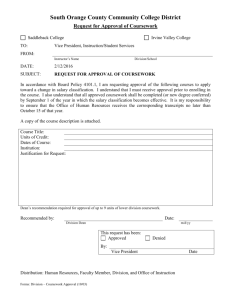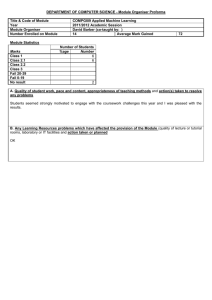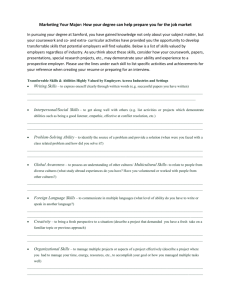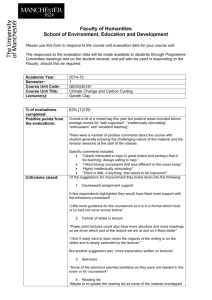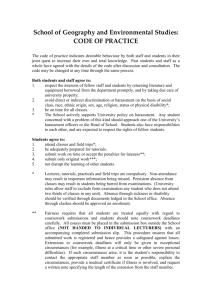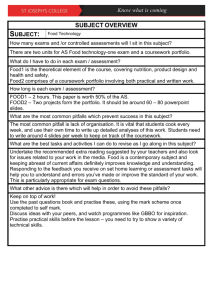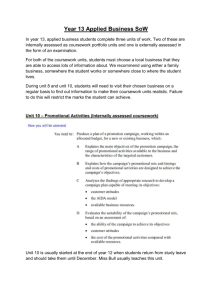University Study Tips - Think St. Edward`s University
advertisement
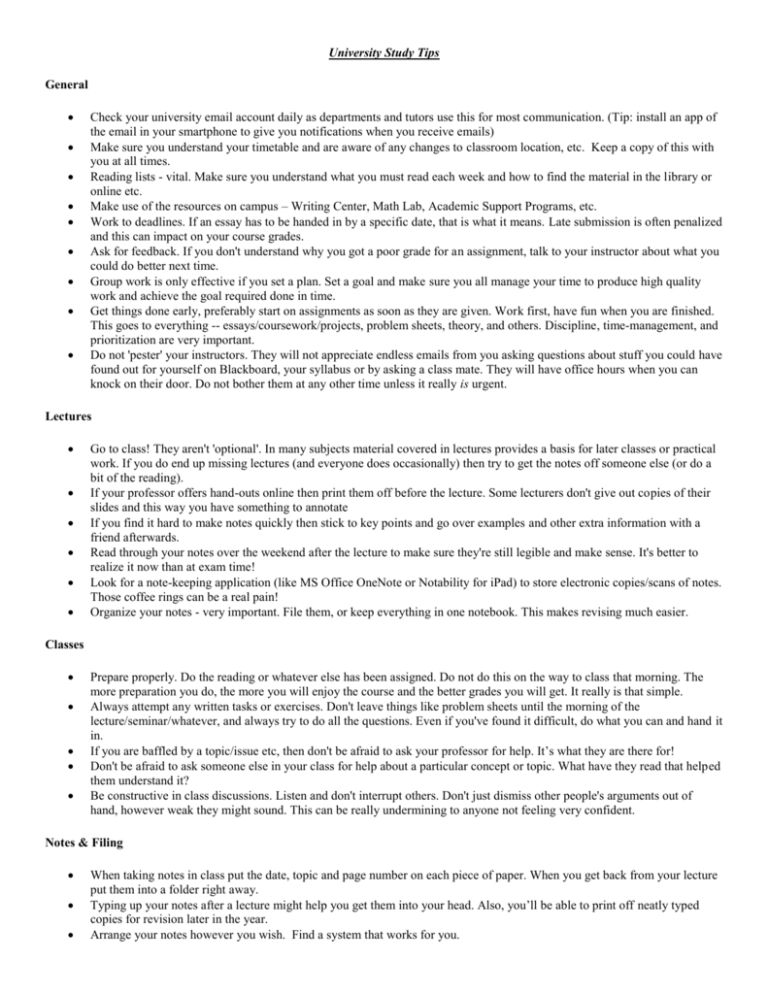
University Study Tips General Check your university email account daily as departments and tutors use this for most communication. (Tip: install an app of the email in your smartphone to give you notifications when you receive emails) Make sure you understand your timetable and are aware of any changes to classroom location, etc. Keep a copy of this with you at all times. Reading lists - vital. Make sure you understand what you must read each week and how to find the material in the library or online etc. Make use of the resources on campus – Writing Center, Math Lab, Academic Support Programs, etc. Work to deadlines. If an essay has to be handed in by a specific date, that is what it means. Late submission is often penalized and this can impact on your course grades. Ask for feedback. If you don't understand why you got a poor grade for an assignment, talk to your instructor about what you could do better next time. Group work is only effective if you set a plan. Set a goal and make sure you all manage your time to produce high quality work and achieve the goal required done in time. Get things done early, preferably start on assignments as soon as they are given. Work first, have fun when you are finished. This goes to everything -- essays/coursework/projects, problem sheets, theory, and others. Discipline, time-management, and prioritization are very important. Do not 'pester' your instructors. They will not appreciate endless emails from you asking questions about stuff you could have found out for yourself on Blackboard, your syllabus or by asking a class mate. They will have office hours when you can knock on their door. Do not bother them at any other time unless it really is urgent. Lectures Go to class! They aren't 'optional'. In many subjects material covered in lectures provides a basis for later classes or practical work. If you do end up missing lectures (and everyone does occasionally) then try to get the notes off someone else (or do a bit of the reading). If your professor offers hand-outs online then print them off before the lecture. Some lecturers don't give out copies of their slides and this way you have something to annotate If you find it hard to make notes quickly then stick to key points and go over examples and other extra information with a friend afterwards. Read through your notes over the weekend after the lecture to make sure they're still legible and make sense. It's better to realize it now than at exam time! Look for a note-keeping application (like MS Office OneNote or Notability for iPad) to store electronic copies/scans of notes. Those coffee rings can be a real pain! Organize your notes - very important. File them, or keep everything in one notebook. This makes revising much easier. Classes Prepare properly. Do the reading or whatever else has been assigned. Do not do this on the way to class that morning. The more preparation you do, the more you will enjoy the course and the better grades you will get. It really is that simple. Always attempt any written tasks or exercises. Don't leave things like problem sheets until the morning of the lecture/seminar/whatever, and always try to do all the questions. Even if you've found it difficult, do what you can and hand it in. If you are baffled by a topic/issue etc, then don't be afraid to ask your professor for help. It’s what they are there for! Don't be afraid to ask someone else in your class for help about a particular concept or topic. What have they read that helped them understand it? Be constructive in class discussions. Listen and don't interrupt others. Don't just dismiss other people's arguments out of hand, however weak they might sound. This can be really undermining to anyone not feeling very confident. Notes & Filing When taking notes in class put the date, topic and page number on each piece of paper. When you get back from your lecture put them into a folder right away. Typing up your notes after a lecture might help you get them into your head. Also, you’ll be able to print off neatly typed copies for revision later in the year. Arrange your notes however you wish. Find a system that works for you. Coursework Do not leave coursework until the last moment. Prioritize it by how big the assignment is and how far away the deadline is. Mark days in your planner for both reading and writing essays. Be realistic about how long something will take. Good essays are not written in an hour. Read the texts on the reading list, and follow up references within those and do 'extra' reading if you have time. If you can't find required reading material in the library, ask library staff for help. If you are confused by any part of your coursework, ask your instructor. Fulfill all the parts of the coursework requested. Grades are often not given for incomplete work. If you are genuinely unable to complete an assignment on time (illness, family emergency, etc) tell your instructor before the deadline. Check the Works Cited system you are supposed to use. Ensure you use it. Plagiarism and all other forms of cheating are taken extremely seriously by the university. Do not be tempted to pass off anyone else's work as your own. Stamina Staying up until 4am watching TV when you have a 9am lecture is not a good way to learn. Partying all week and then trying to cram a week's work into one afternoon is also not a good way to study. Be realistic about the amount of paid work you can do without falling behind in your coursework and feeling exhausted most of the time. You came to college to study and learn, not work at Starbucks.
